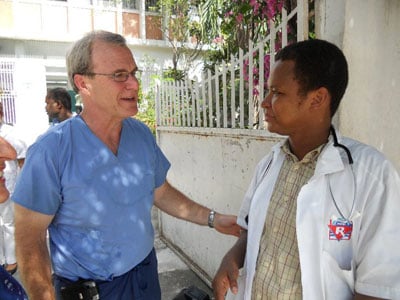At any given time of year, there are scores of students, faculty and researchers off campus—some way, way off campus—in the Dominican Republic, Peru, Ghana, Liberia—providing aid, serving fellowships and gaining experience they can apply to their work, and their patients, here at home. As an ongoing, periodic feature on UMassMedNow, we will profile some of these travelers and give you some insight into the impact—both small scale and large—that the people of UMMS are making on our world.
|
|
When a devastating earthquake struck Haiti last winter, UMass Medical School joined numerous relief organizations from around the world in sending donations, medical supplies, equipment, food and—perhaps most importantly—medical professionals to help care for victims.
A team of 15 nurses and doctors from the School of Medicine, the Graduate School of Nursing and UMass Memorial Health Care, was organized in response to a call for help from colleagues at Good Samaritan Hospital in the neighboring Dominican Republic. Led by Terence R. Flotte, MD, provost, dean of the School of Medicine and pediatrician at the UMass Memorial Children’s Medical Center, they spent a week caring for scores of patients in one of the many overcrowded tent camps that sprung up around Port-Au-Prince. Additionally, colleagues from the UMass Memorial-sponsored Disaster Medical Assistance Team also traveled to Haiti to provide continued assistance to an international surgical team.
Like many people who respond to such humanitarian emergencies, members of the UMMS team found their days in Haiti to be a profound experience, and they think often of the families they cared for at the height of the crisis. While many dream of returning to provide more help, some are fortunate to do so: during his vacation in July, Dean Flotte, a pediatric pulmonologist, traveled back to Haiti for a week to care for children still living in the tent camps and suffering the health effects of the earthquake, the dire conditions in the tent camps and the collapse of the health care infrastructure. Problems like malnutrition, malaria, tuberculosis and HIV are ever-present in Haiti and were exacerbated by the crisis. Other infectious diseases have been spreading almost unchecked in the camps, particularly gastrointestinal and respiratory infections that can easily become endemic in areas lacking sanitation and clean water.
In addition to providing direct patient care to children at Haiti’s University and Educational Hospital (HUEH), where a series of medical tents had been erected to house clinics—two outpatient clinics and five inpatient, as well as an emergency department—Flotte worked with a team formed to shore up the medical educational infrastructure in Haiti and help supplement the graduate medical education faculty at HUEH.
Shortly after the earthquake, the American Academy of Pediatrics and the Haitian Pediatric Society began collaborating with the nonprofit humanitarian aid organization Health Frontiers to screen and select volunteers from academic medical centers across the United States to serves as temporary teaching faculty at HUEH. The medical school had been heavily damaged and scores of faculty, administrators and students left the country in the wake of the disaster, leaving the future of the school and its students—as well as the long-term ability of the country to appropriately care for its people—in question.
“Nearly the entire second-year class of the nursing school died when their building was destroyed in the earthquake,” said Flotte. “Many faculty have left; the residents and students need considerable support to sustain the efforts of those who have remained. There’s no lab or classroom space but the residents and students are dogged in their determination to continue their education and serve their community.” There are approximately 100 students per class in the medical school, which is a six-year program that commences after high school.
Flotte presented didactic lectures on pneumonia and asthma to the 25 pediatric residents at HUEH, which, prior to the earthquake, annually treated nearly 170,000 people. The patient base has since expanded to half a million people.
“Students were eager to learn and spent hours and hours with us, asking for more and more information,” said Flotte, who also taught students in the school’s journal club how to read and interpret biostatistics in medical literature.
Efforts are underway to establish a consortium of American and international universities to support the faculty and residents while Haiti rebuilds. “I would love for UMass Medical School to be a source for future volunteers—there are specific issues we may be able to help with,” Flotte said, noting that the depth of pediatric specialty and subspecialty expertise—such as pediatric cardiology and pediatric pulmonology—would be of great benefit to the Haitian students. “It’s human nature to want to help, and we’re fortunate to have the expertise to do so.”
